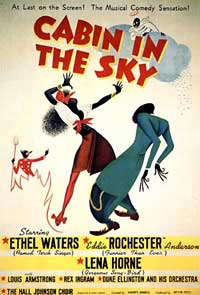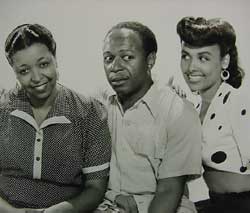 A Romanticist folk tale sprung to life, Cabin in the Sky (1943) was based on the Broadway musical of the same name.
A Romanticist folk tale sprung to life, Cabin in the Sky (1943) was based on the Broadway musical of the same name.
It stars Ethel Waters as Petunia, a good Christian woman who adores her husband Little Joe (Eddie "Rochester" Anderson), a man good at heart but a sinner who cannot defeat his urge to gamble.
A lot has been written of the racism & evasiveness inherent to the utopian romance of "separate but equal," white writers & white directors fantasizing a separatist rural world of utopian poverty & exaggerated religiosity as the only good life for African Americans.
But I like this film so much that I want more to address it as fine storytelling, & delightful music, & assume anyone who bothers to read about this film already understands the political takes, which I can skim past with awareness assumed. As in the main, this is a film that merits praise.
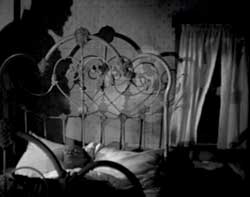 Little Joe sneaks out of church to gamble one more time before he accepts redemption, & ends up getting shot in the stomach. The doctor thinks he'll probably pull through, but in the middle of the night, he dies. Little Joe sneaks out of church to gamble one more time before he accepts redemption, & ends up getting shot in the stomach. The doctor thinks he'll probably pull through, but in the middle of the night, he dies.
His soul hangs in the balance, between the interests of Lucifer, Jr. (Rex Ingram) & angels of the Lord (headed by Oscar Polk as Fleetfoot; he was Gabriel in Green Pastures).
Grieving beside Joe's deathbed, heartbroken Petunia is stricken not only by her loss, but by Joe having died without being redeemed.
"Dat is terrific prayin'," the devil admits to his minions, as Petunia begs the Lord for assistance. That's when the white-clad angel appears with his own assistents.
Due to the strength of Petunia's prayers, Joe is given an extra six months of life, during which he must improve his soul, but with no memory of having met the angels & the demons who're competing for his immortal part.
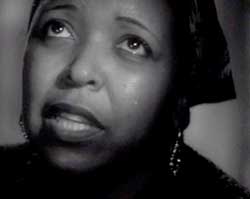 As a musical, Cabin in the Sky has some delightful numbers. The traditional hymns are by the well-famed Hall Johnson Choir, who sing "Old Ship of Zion" &, with Ethel Waters, "Little Black Sheep."
As a musical, Cabin in the Sky has some delightful numbers. The traditional hymns are by the well-famed Hall Johnson Choir, who sing "Old Ship of Zion" &, with Ethel Waters, "Little Black Sheep."
Ethel has a great number, "Happiness is Just a Thing Called Joe/ He gotta smile that make the lilac want to grow/ He gotta way that make the angels heave a sigh/ When they know little Joe's passing by..."
And at the height of their happiness together, Ethel sings, "There's a Little Cabin in the Sky," & Eddie Anderson sings part of it as well. Into that pastoral scene saunter the members of the Hall Johnson Choir to join in.
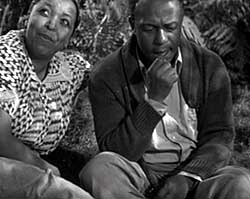 Ethel will also sing "Here I Go Again (Taking a Chance on Love)": Ethel will also sing "Here I Go Again (Taking a Chance on Love)":
"Here I go again/ I hear those trumpets blow again/ All algow again/ Taking a chance on love./ Here I slide again/ About to take that ride again/ Starry eyed again/ Taking a chance on love..."
As part of this number, a visitor (Fayard Nicholas!) to Petunia & Joe's household tapdances & Eddie does a comic soft shoe.
Well, Fayard's intrusion is one of the more strained sequences since he isn't otherwise a character in the story. But in the main, the songs fit well in the places they occur, & who can really complain about getting to see Fayard dance, without or without his brother.
Louis Armstrong is one of the "idea men" in Hell, dark counterpart to Gabriel we might suppose, since he always has his horn.
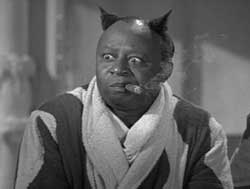 It's unfortunate that his key number was cut from the film for length. The footage is lost, but among the extras on the dvd is a collage of scenes from the film, put to Louis's missing trumpet solo for "Ain't it the Truth." It's unfortunate that his key number was cut from the film for length. The footage is lost, but among the extras on the dvd is a collage of scenes from the film, put to Louis's missing trumpet solo for "Ain't it the Truth."
To put Armstrong in a film carrying his horn about & never really getting round to playing it seems absurd, the more so since his name was used prominantly in contemporary posters.
Yet his role is very, very small, no greater than that of Mantan, of "Moke & Poke" (i.e., Fletcher Rivers & Leon James), & of Willlie Best who're also among Lucifer Jr's idea men, among whom only Mantan manages to mug & eye-bulge his way to effective attention, the rest being rather faint figures in the cast.
I'm a great fan of Mantan, but this cluster of actors are generally thought of as from the same school as the far less likeable Stepiln Fetchit, And if such an assessment were accepted as the case for the whole lot, then it's all the more annoying that this is the position given Louis Armstrong.
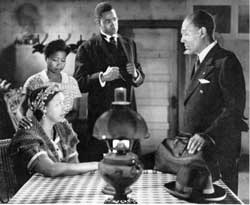 Another under-utilized character is Lily played by Butterfly McQueen, a wonderful actress with a sweet if somewhat childish speaking voice, best remembered today for scene-stealing in Gone with the Wind (1939).
Another under-utilized character is Lily played by Butterfly McQueen, a wonderful actress with a sweet if somewhat childish speaking voice, best remembered today for scene-stealing in Gone with the Wind (1939).
About her role of Prissy, Scarlett's house slave, she said, "It was not a pleasant part to play. I didn't want to be that little slave. But I did my best, my very best."
She was also the model for the Mrs. Butterworth syrup bottle, & like most great black actresses who deserved better, she was typecast as a maid.
As a curious aside, given the abject religiosity of Cabin in the Sky, Butterfly was a lifelong athiest, & a Freethought Award winning activist for the Freedom From Religion Foundation.
She said, "My ancestors escaped slavery. And I have escaped the slavery of religion." Even religious African American actors wearied of the cinematic stereotype of black folk always jesus-dis & jesus-dat, & one has to suppose it especially rankled Butterfly. She left film acting prematurely because it was dispiriting always & only in demand to play such stereotypes.
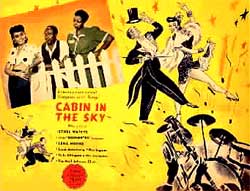 Butterfly was a singer & a noted dancer from the Katherine Dunham troupe, but she's given nothing very interesting to do in the film. Butterfly was a singer & a noted dancer from the Katherine Dunham troupe, but she's given nothing very interesting to do in the film.
You'd think if they could grab one of the Nicholas brothers for an awkwardly placed tapdance routine, they could've written a jazz-dance scene for Butterfly, but no, she gets nothing. And I for one feel deprived that in her whole career I as a sponge for film entertainment never got to see her do the great things that were in her.
As Lily, she lives with Petunia & Joe but her role is never entirely explained. She actually seems like Petunia's maid, which would be absurd, given that Petunia was a poor woman herself. Yet nothing familial passes between them. Her presence is a tantalizing tease that never adds up. I have to assume some of her scenes were snipped along with Louis Armstrong's & some other significant material.
Said significant material includes what would've been Lena Horne's best scene singing "Ain't it the Truth" in a bubble bath. It was excised because she was too damned sexy for Hollywood to embrace in a black woman. This deleted footage happily survives, incorporated in the contemporary short subject A Studio Visit (1946) reviewed further below.
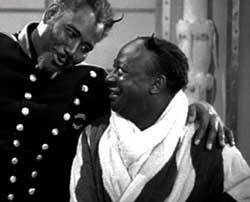 Rex Ingram plays a pretty cool devil, but when I was a child, I saw him play De Lawd in Green Pastures, & for me, God always kind of looked like Rex Ingram. So when I next saw him playing the devil, I wasn't as convinced, he's much more obviously God.
Rex Ingram plays a pretty cool devil, but when I was a child, I saw him play De Lawd in Green Pastures, & for me, God always kind of looked like Rex Ingram. So when I next saw him playing the devil, I wasn't as convinced, he's much more obviously God.
His idea men eventually light upon the idea of having Little Joe win the Irish sweepstakes, as wealth will lead him to every temptation, & especially to the temptress Georgia Brown (Lena Horne). Little Joe had overcome her seduction by singing the wondrous comic song "Live is Full of Consquence/ That Old Devil Consequence" with her.
When Petunia mistakenly kicks Joe out believing she has caught him in a compromised position with Georgia, he returns to the Paradise Club, the place of his initial downfall. Duke Ellington is performing "Going Up" at the Club.
As is too often the case in black-cast films, jazz becomes the symbol of Decadence & Sin, which is is somethingthing I have trouble with, & I can't help but note that in films with white jazz singers, a love of jazz is not evil.
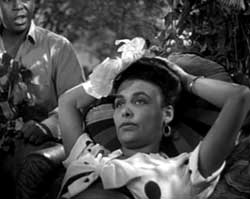 There was indeed a time when "race music" was believed by most whites & even a few blacks to be the devil's music. There was indeed a time when "race music" was believed by most whites & even a few blacks to be the devil's music.
Even after jazz became more or less respectable, in black-cast films it could still be used to distinguish a "good" rural life of poverty from a "bad" urban life without reference to it actually being central to the Harlem Renaissance & a very good thing indeed going hand in hand with art, dance, poetry, theater, & literature.
The elegant set with elegant Ellington at its center completely defeats the symbolic intent of making the Paradise Club a den of iniquity. There's a cool trumbone solo & a wild Lindy Hop dance sequence featuring Archie Savage (who like Butterfly McQueen had trained with the Kathrine Dunham Troupe), & hey, I wish I'd been there.
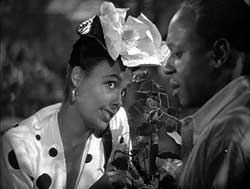 But den of iniquity it is & soon Domino (John W. "Bubbles" Sublett), who nearly killed Little Joe previously, has just gotten out of jail. He think's Georgia Brown's still his gal, but she thinks different, having gotten to like Joe even before he became a rich guy kicked out by his wife. But den of iniquity it is & soon Domino (John W. "Bubbles" Sublett), who nearly killed Little Joe previously, has just gotten out of jail. He think's Georgia Brown's still his gal, but she thinks different, having gotten to like Joe even before he became a rich guy kicked out by his wife.
Domino is a damned fun "bad guy." He sings a very nice number partly about about dressing well, & being judged by appearances. It's a variation on the classic "That's Why They Call Me Shine," a number that deserves some discussion in itself, for which see my review of Louis Armstrong's soundie Shine (1942).
Joe misses Petenia but has nevertheless been having a swell time since Petunia kicked him out, given that he's rich & has Georgia. But it could cost him his soul, for his six months extension of life are running out.
Lena sings "There's honey in the honeycomb/ There's sugar in the cane/ There's oyster in a real oyster stew/ And bubbles in sweet champaigne/ There's jelly in the jelly roll/ And sap in every tree/ Oh there's honey in the honeycomb/ And, honey, there's love in me."
As femme fatales go, Georgia Brown just at one, as at heart a good woman. I had a lot of trouble viewing her as the devil's minion. Fortunately the script does understand this about her, & before the tale is over, she'll have slipped out of the devil's noose.
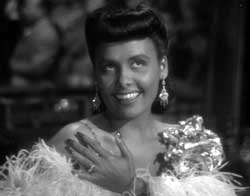 Much earlier in the film when Petunia out-flimflams a crooked gambler, by which we understand she has an unspoken history larger than her present religious life.
Much earlier in the film when Petunia out-flimflams a crooked gambler, by which we understand she has an unspoken history larger than her present religious life.
So when she turns up at the Paradise Club to behave as Joe has behaved, we're not all that surprised there's more to her than the religious housewife in a print dress & scarf around her haid.
She is seemingly "backsliding" into a glamourous mood while claiming half Joe's winnings as community property. He's already spent half on gambling & on Georgia, so if she claims the rest, he's a poor man again.
Worse yet, she comes on to Domino Johnson. So Joe's got Georgia & Petunia's got Domino. And about here she sings "Honey in the Honeycomb" even better than had Lena.
[SPOILER ALERT!] When the fight breaks out in Jim Henry's Paradise Club, Petunia with her power of prayer asks the lord to "destroy this wicked place!" That's when the tornado comes (recycling a bit of the tornado footage from The Wizard of Oz).
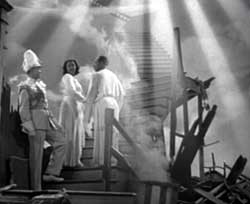 In the rowdy fighting & the storm, Domino accidentally shots Petunia, & intentionally shoots Joe. The Paradise Club falls into a ruin, wherein Joe & Petunia's spirts linger. In the rowdy fighting & the storm, Domino accidentally shots Petunia, & intentionally shoots Joe. The Paradise Club falls into a ruin, wherein Joe & Petunia's spirts linger.
A final battle of wills arises between the devils & the angels for where Joe belongs, but the angels know Petinua was never really a backslider but had only come to rattle some sense into Joe, & it is her prayerful authority on which Joe's immortal fate depends.
Instead of a golden staircase to the pearly gates, a crooked wooden staircase appears, reaching into heaven's Cabin in the Sky, where Joe & Petunia can live immortal lives of happy rural poverty, which can be a cloying bit of romanticism, but what the hell, if I had a sweet cabin in the forest with craft-movement furniture, that'd be close enough to heaven for me.
It is upon Petunia's strength that Joe's ability to climb that stairway relies, & it almost looks like he's not going to make it, as he gets wearier & wearier, & may tumble back down into Hades. But then the film plays that "it was all a dream" trick on us, & Joe after all recovers from his initial gunshot & lives a good Christian life with Petunia for the rest of their lives. [END SPOILER ALERT]
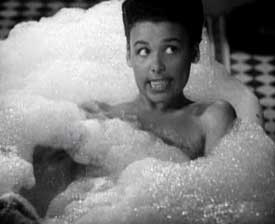 The one-reel short subject Studio Visit (1946) is "a Pete Smith Specialty Narrated & Produced by a Smith named Pete."
The one-reel short subject Studio Visit (1946) is "a Pete Smith Specialty Narrated & Produced by a Smith named Pete."
It's not the usual behind-the-scenes documentary though it pretends to be. It mixes novelty acts & skits with an important outtake from Cabin in the Sky & comes off more like a variety show. And it's quite entertaining.
We first see "the busiest studio on the lot, where a Pete Smith Specialty is in production. Here you'll see action, speed, effeciency. Here everybody's working."
We then enter a dimly lit environment where nobody's doing a thing productive. They're napping, playing checkers, or goofing off while waiting for one incompetent janitor serving as set designer not getting the job done. We'll return to this setting periodically through the film until an entire comedy sketch is completed, spoofing behind-the-scenes short subjects.
In the meantime, the travelling camera takes is to another studio, where we "observe the nimble hands of Louis Zingone," a slight of hand artist who gives a display of the "shell game" then replays the trick as the camera photographs how it's done from underneath a glass table.
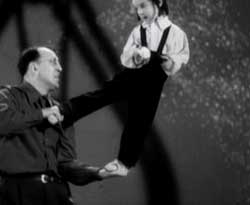 The next studio visit is never identified as to what it is, but it's a scene intended for Cabin in the Sky removed because executives were alarmed by how sexy Lena Horne comes off. The next studio visit is never identified as to what it is, but it's a scene intended for Cabin in the Sky removed because executives were alarmed by how sexy Lena Horne comes off.
It's the type of scene that was cliche for white actresses to do without censor. She's in a bathtub with just her head sticking out of the bubbles & she sings "Ain't it the Truth" which would've added a great deal to her role in Cabin in the Sky if they'd left it in.
A scene with Louis Armstrong was also deleted & subsequently lost, so it's a good thing Pete Smith decided to use this bit of discarded footage for his Studio Visit so that it survives in fine condition.
Lena's footage is probably the whole reason Studio Visit was made, & certainly is the important highlight. But there is one other sequence that's pretty amazing, a surprising variety act involving "tiny Helen Sue Goldy & her pappy Sid."
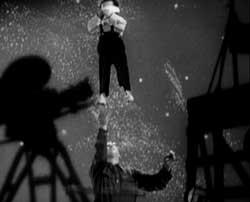 She's three years old & eating an apple the whole time; narrator Pete tells us she won't do any of these stunts unless she can eat an apple too. "She just won't do her stuff unless she has an apple & that's all there is to it." She's three years old & eating an apple the whole time; narrator Pete tells us she won't do any of these stunts unless she can eat an apple too. "She just won't do her stuff unless she has an apple & that's all there is to it."
Itty bitty Helen is put through a veritable juggling & blancing act, with her playing the role of the juggling pin.
A medical condition of the ear is alleged by Pete to explain the toddler's inconceivable balancing skills. I'm sure the father'd be arrested if he did this act under today's level of child advocacy.
Pete claims that father & daughter are practicing their act for a movie, but they never did it in any movie, & like the slight-of-hand magician, the whole affectation of being back stage at several Movieland studios just ain't the case. And this is the only film document of an act that couldn't've lasted more than a year or so, as the growing child would soon no longer be light enough for Sid to toss about in in this manner.
She's put in unusual balancing position, even blindfolded & just keeps eating the apple, a cute kid with a totally emotionless expression fixated on her apple & not at all annoyed with the stuff daddy's doing with her. The finale involves dropping her head-first to within an inch of a concussion.
copyright © by Paghat the Ratgirl
|
